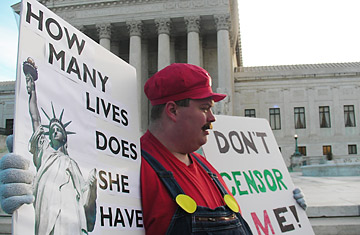
A protester dressed as the video-game character Super Mario pickets outside the Supreme Court
A little before 9 a.m. today, seven protesters — one dressed as Super Mario, complete with mustache — stood outside the U.S. Supreme Court to oppose the California law about to be hotly debated inside. At the center of the hearing was this question: Can a state prohibit the sale of violent video games to minors, or does that amount to a violation of free speech?
"I don't think keeping violent video games out of the hands of minors is the government's job," says Lisa McKee, 26, who had accompanied her plumber-suited friend from Delaware to rally against the law. "It's the parents' job to monitor what their children are playing." But the legal team behind Governor Arnold Schwarzenegger, who signed the law in 2005, says the measure is meant to help parents guard their children from violence, in much the same way that laws limiting the sale of pornography are supposed to guard them from obscenity.
The Justices produced no shortage of colorful examples to support or attack the arguments from both sides. Justice Stephen Breyer, for example, more than once painted the picture of 10-year-olds torturing babies and setting virtual schoolgirls on fire to illustrate "commonsense" limits. Justice Sonia Sotomayor, meanwhile, turned to Looney Tunes to show how hard violence is to regulate: "One of the studies ... says that the effect of violence is the same for a Bugs Bunny episode as it is for a violent video. So can the legislature now, because it has that study, say we can outlaw Bugs Bunny?"
The marble hallways of the courthouse were filled with lines of people hoping to see the hearing, a sign that the subject was sexier than the usual fare. There was an underlying irony in the onetime Terminator's objecting to simulated violence along with the classic worry that playing video games will turn kids into ticking time bombs of aggression. At stake were the hopes of civil-rights defenders like the ACLU, bent on shielding the First Amendment from any attack. And, of course, there was money on the line: that of the $10.5 billion U.S. gaming industry, for a start, and by extension, that of the motion-picture and music industries, which would see the restriction of video games as a step toward more restrictions on themselves.
The wording of the law, which would regulate games that appeal to the "deviant or morbid" interest of minors, quickly came under fire. "What's a deviant — a deviant violent video game? As opposed to what? A normal violent video game?" asked Justice Antonin Scalia a few minutes into the hearing. "Some of the Grimm's Fairy Tales are quite grim." Later Justice Elena Kagan, President Obama's new appointee, quizzed the California lawyer about whether Mortal Kombat, an "iconic game," would be considered off-limits. "I am sure half of the clerks who work for us spent considerable amounts of time in their adolescence playing," she said. (To which Scalia playfully replied, to much guffawing, "I don't know what she's talking about.")
The Violent Video Games Act was never enacted, so the lawyer for California could only hazard a guess about which games would be regulated. Trade groups sued early on, putting the law in limbo, and lower courts ruled that because video games were a form of expression, the law did indeed violate the First Amendment. The Supreme Court Justices seemed loathe to put a new limit on constitutionally protected speech, but they seemed equally reluctant to say the government could play no role in keeping gruesome games out of children's hands.
As it stands, video games are rated in a voluntary system (through the self-regulated Entertainment Software Rating Board) that marks games meant for players age 17 and older as "Mature." A Federal Trade Commission study from 2009 found that this regulatory code was more stringent than those used for movies and music and was regularly enforced by retailers even though it's not legally required.
By the time the hourlong hearing came to a close, the number of protesters had ballooned. Many were from youth-rights organizations and felt that kids should have a say in the matter. "This law discriminates against young people, in that young people are the ones who are being targeted in this law," says Alex Koroknay-Palicz, 29, executive director of the National Youth Rights Association. "Anything young people are interested in, adults are scared of ... Today's Election Day. People around the country are making their voices heard, and young people are completely cut out of that system."
But at least one of those youthful voices would speak out in favor of the California law. "I have a lot of friends [who] play video games that are M-rated, and you definitely see that it does have an effect on them. They're a lot more violent, and they're more aggressive," says Cole Cooper, a 13-year-old who attended the arguments with his father. "I personally think it's the logical thing to do."
